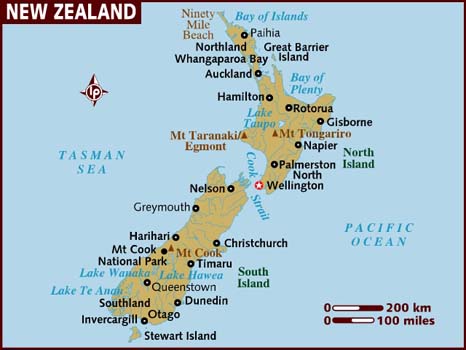
New Zealand is one of the preferred destinations for Indian students to study and settle. Over years Lakhs of Indians has settled in New Zealand. New Zealand is a developed country with plenty of job opportunities. Main Cities in New Zealand where Indians go are Auckland, Wellington and Hamilton. One can study and settle in New Zealand for ~5-15 Lakhs INR.
Courses and Exams
Indian student go to New Zealand for both undergraduate and postgraduate courses in business, science and engineering. The students need to clear class 12th (with 50% marks) for UG admission and bachelors (with 50% marks) for PG admission. English test IELTS (International English Language Testing System) needs to be given by every student looking to study in New Zealand. For UG one needs to score 6 in IELTS and for PG 6 in IELTS
Education and Living cost
Education cost for UG is around 20 lakhs INR for 3 years while for PG is around 10 lakhs INR for 1 year. Accommodation and Food is the main living cost incurred by students. All universities and colleges provide accommodation to the students. Most of the students don’t take them as they prefer to take off campus accommodation which is lesser than the price of On Campus. Many students prefer to live outside campus to share the lower cost of living with friends. There are options of Food for Indians and most New Zealand cities have Indian restaurants and shops. Per year living cost is around 5 lakhs INR. Hence total cost for UG would be around 35 lakhs INR and PG would be around 15 lakhs INR.
Part-time Jobs
New Zealand treats students as adults and provides them ample opportunities to learn and earn. Many part-time jobs are available for students within the campus and also around the campus. In New Zealand these part-time jobs are considered very respectful and also give a student a real life experience at work. This also enables student to earn their living cost and also understand the value of money. These jobs are like being accountants / cashier, managers at stores, sales people for different companies etc. Money is earned on hourly basis and minimum amount is pre decided. To make sure that student focus on study the government has restricted the part time job to only 20 hours per week. Typically a student can earn more than ~6 lakh INR per year.
Availability of Finances
Finances – for college admission a student needs to keep 1 year of living cost ~5 Lakh INR. Apart from this 1st year tuition cost – around ~10 Lakh INR need to be transferred on confirmation of admission. Hence funds with around 15 Lakh INR. Funds can be fresh in your bank account and shouldn’t be old unlike other countries like US and UK.
Job and Post study work-permit & Permanent Residency
After completing 2 years of full time Diploma or Degree in New Zealand a student get up to 3 years of work permit. During this work permit the day student completes 12 month of Full Time work experience he is eligible to apply for Permanent residency. It takes ~12 months to have it. After one year of course, student can get 1 year of work permit.
COST OF EDUCATION IN NEW ZEALAND
Not just studying in New Zealand, but moving to a different country for your education comes with a whole of baggage and planning. Expenditure is one of the core aspects to look into since the economies of countries are highly variable. The student must be sure beforehand that he/she can conveniently afford the minimum living costs of the place along with the college fee. Thus, to make the process easier, we’ve compiled are research to present estimated costs of studying in New Zealand, so that that student can move on to focus on the next step of their stay in the country.
TUITION FEE
This is going to be the primary expenditure a student has to face and will probably be one of the highest they come across. Although the amount of tuition fee would largely depend on the course and the university, along with any scholarships granted to the applicant. An indicative idea would be about NZ$ 22,000 to NZ$35,000 a year. Anyone who’s already gotten into a college would be aware of the fee structure, and anyone planning to apply to should look into its tuition fee before concluding.
Similar to most countries, generalized courses such as humanities and education courses are cheaper whereas specialized courses such as engineering and medicine are likely to be relatively more expensive. Similarly, post-graduate courses are much more expensive than undergraduate courses on a per annum scale but shorter in duration. It is highly recommended to also apply for scholarships, you never know when you get lucky!
VISA COSTS
It is best to consult a counsellor regarding the student visa process as it must not fiddled with. A valid student comes with its own costs and can cost anywhere around NZ$ 270.
ACCOMMODATION COSTS
It is preferable that students, especially international ones, opt for on-campus accommodation facilities. It is not only much more affordable, but it would be much easier for you to connect with those around you as well as suit your educational requirements. Being around both international and native students from similar courses will enhance social life, bring you easy help and allow you to settle conveniently in a country you are absolutely clueless about – in short, it’s a great way to make friends quickly!
The only challenge posed is that not everyone would get to have access to this facility, which is primarily decided either based on score or a first-cum-first-serve basis. It is essential to book a slot for yourself as early as possible, which should cost around NZ$ 215-515 per week, where each student has the option to choose either fully-catered or self-catered halls of residence.
If a student desires to live off-campus, the most common options include renting an apartment with shared room-mates (generally from the same university or ethnicity), or a homestay with a local family. An off-campus accommodation can cost anywhere around NZ$ 120, but will vary from city to city.
A temporary option for those landing before the date of tenancy are youth hostels such as YMCA, where a student can choose to stay at student resident halls, shared flats or private flats, costing NZ$ 200, NZ$ 120 and NZ$ 180 on a weekly basis respectively.
LIVING EXPENSES
Living expenses cover a variety of sub-categories but essentially refer to all things that you need to survive in a city such as food, transportation, toiletries, social activities etc. It is a good practice to set a budget beforehand and document each expense so as to not overspend. Considering all costs, a student is New Zealand generally carries a total of NZ$ 13,000 – 16,000 per academic year, including accommodation and tuition. For students applying for a year or more need to present an evidence of NZ$ 15,000 for the same reason, and should keep in mind a budget of around NZ$ 1250 per month, inclusive of all expenses.
A breakdown summary of living costs per week in NZ$ is highlighted below:
- Food and drinks (136.50)
- Clothing (16.70)
- Household Utilities (202.10)
- Household Services (32.20)
- Health (34.90)
- Transport (79.50)
- Communication (23.80)
- Recreational Activities (64.20)
- Education (15.30)
- Miscellaneous G&S (71.70)
- Other (56.20)
An outline into transportation: Students generally have two options – either the college provides a shuttle services to and fro or the student would use public transportation
Transportation would be both short distance (regional trains, buses and subways) and long distance (rail, air, ferries, and water taxies). For short-distance travel, it is best to sign up for monthly passes which can be fairly cheap. A buffer amount should be kept for long-distance travel occasionally.
HEALTH INSURANCE
Health insurance is a mandatory, so don’t even plan to skip on this. Students can also enroll for health insurance programs offered by many New Zealand’s universities for international students which cease as soon as the program ends. However, not all colleges will offer a comprehensive health insurance plan, in which case the student needs to approach to private medical insurances. This may lie with an approximate range of NZ$ 200 – 700 per annum. Readily available health support is considerable cheap for international students where the lowest plan is offered by Orbit Protect for NZ$ 454 for a year while the most popular choice, StudentSafe, costs NZ$ 590.
TAXES
Most college students prefer working part-time, alongside their education, to ease the burden of expenses. To work in New Zealand, and IRD or an Inland Revenue Department Number is to be generated which permits the student to work for 20 hours per week during academic sessions and full-time during vacations. This earned income is taxable, and should not be ignored.
The budgeting process involved varies on a lot of factors and their will be a high influx based on exchange rate variations. This makes a part-time job and scholarships a must during your stay in New Zealand.
Please click below for the Study and Settle Abroad brochure
For more information, You can contact us at info@gkworks.in or call 9643362320 to Schedule an appointment or Contact your nearest branch now
Following might help you as well.
SETTLE ABROAD
Skilled Immigration
Study and Settle Abroad
How to find your first job in Canada
Top 7 colleges in Melbourne Australia
MBBS ABROAD
Medical Admissions
- MBBS Abroad
- MBBS in China
- MBBS in Georgia
- MBBS in Kazakhstan
- MBBS in Kyrgyzstan
- MBBS in Philippines
- MBBS in Ukraine
- MBBS in Russia
- MBBS in Armenia
- MBBS in Belarus
- MBBS in Nepal
- MBBS in Bangladesh





